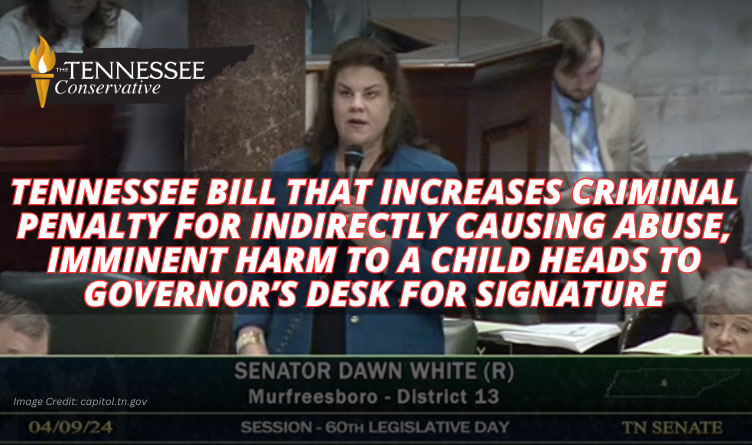Image Credit: capitol.tn.gov
The Tennessee Conservative [By Kelly M. Jackson] –
A bill that increases the penalty for those who indirectly cause harm or death to a child (in that they aren’t the actual person who inflicted the abuse) heads to Governor Lee’s desk for signature as it has passed successfully through both chambers of the General Assembly.
House Bill 1817 (HB1817) and its companion in the Senate, SB2662, states,” Criminal Offenses – As introduced, increases the penalty from a Class A misdemeanor to a Class D felony for the offense of child endangerment by a parent or custodian of a child eight years of age or less if the parent or guardian knowingly exposes the child to, or knowingly fails to protect the child from, abuse or neglect resulting in physical injury or imminent danger to the child; increases the penalty from a Class D felony to a Class B felony for a person who negligently, by act or omission, engages in conduct that places a child eight years of age or less in imminent danger of death, bodily injury, or physical or mental impairment. – Amends TCA Title 39.”
The bill was carried in the House by Representative Mary Littleton (R-D78-Dickson) and in the state senate by Senator Dawn White (R-D13-Murfreesboro).

To understand the differences from the current law, versus the changes that this bill would impose, the key is within the legal definitions of the terms “knowingly” and “negligently” and the differences between the criminal consequences of misdemeanors and felonies.
First, the legal definition of acting “knowingly” means that the defendant is practically certain that the conduct will cause a particular result.
So, a person who knowingly exposes a child to a person or condition that they are relatively certain will cause “imminent” harm or abuse, will now be charged with a class D felony instead of a class A misdemeanor.
The difference is that with a misdemeanor, the defendant would spend up to one year in jail. The maximum time being 12 months, which much of the time ends up being pleaded down to maybe a few months, or just probation with no jail time served, or dropped all together.
Should this law pass, the punishment will automatically go to a minimum of 2 years’ incarceration, and no more than 4.
Next, the legal definition of “negligently” (not to be confused with “recklessly”) means the defendant was not aware of the risk but should have been aware of the risk (perhaps based on the place, or people who they knew would be involved) and acted in a way that caused abuse or “imminent” harm to a child.
In such a case, the punishment which is currently a D felony with a minimum sentence of not less than 2 years, and no more than 4 years, will be increased to the charge of a B felony which if convicted carries a minimum of not less than 8 years, and no more than 12 years.
These types of penalties might be most appropriate for those who happen to live with a spouse or parent that causes the abuse, and does nothing to mitigate it or stop it by removing the child.
It also isn’t difficult to see that this increase in penalties for those who do not directly inflict harm on children, but rather set the table for such events, have become a recent focus with the steep increase in child trafficking cases in the state of Tennessee.

A recent report stated that Middle Tennessee saw 361 human trafficking calls in 2023 compared to 183 in East Tennessee, 307 in Upper East Tennessee and 265 in West Tennessee.
Further, the report also saw an alarming increase in minor sex trafficking. Over the past eight years, minor sex trafficking reports increased from 66 in 2016 to more than 600 by 2021.
In 2023, minor sex trafficking surpassed all other types of trafficking reported. There were 518 reports of minor sex trafficking as of November of last year.
The reports noted that minor victims’ ages ranged from five months to 17 years old.
Based on this information, it seems prudent for state lawmakers to ensure that those who are involved in the furtherance of these types of crimes which in turn create the circumstances for the severe abuse of a minor child, receive the punishment that they deserve if convicted.
The bill passed on the Senate floor unanimously and passed on the House floor with 86 voting in favor and 2 voting against.
Those Representatives that voted against harsher punishments for people who enable the abuse of children were Democrat Representatives Aftyn Behn (D-D51-Nashville) and Justin Pearson (D-D86-Memphis).
Those in the House counted as Present, Not Voting were Democrats Representative Gloria Johnson D-D90-Knoxville) Representative Justin Jones (D-D52-Nashville) Representative Jason Powell (D-D53-Nashville) and Republican Representative Mike Sparks (R-D49-Smyrna).


About the Author: Kelly Jackson is an escapee from corporate America, and a California refugee to Tennessee. Christ follower, Wife and Mom of three amazing teenagers, she has a BA in Comm from Point Loma Nazarene University, and has a background in law enforcement and human resources. Since the summer of 2020, she has spent any and all free time in the trenches with local grassroots orgs, including Mom’s for Liberty Williamson County and Tennessee Stands as a core member. An outspoken advocate for parents rights, medical freedom, and individual liberty, Kelly also has a YouTube channel @Tennessee_Truth_Teller and is planning on expanding out to other channels soon. Kelly can be reached at kelly@tennesseeconservativenews.com.



